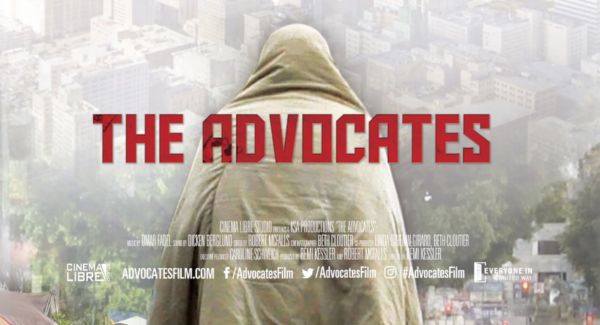The documentary “Homele$$, Inc” explores the intersection of business and homelessness, showcasing Remi Kessler’s commitment to advocacy and raising awareness of the crisis.
by Carole Dean
Homelessness is not just an issue—it’s a crisis that has deeply affected the fabric of our society, especially in Los Angeles, where it’s felt most acutely. For years, many have turned a blind eye to this growing problem, but not Remi Kessler.
 In 2015, Remi took his camera to the streets and began documenting the reality of homelessness in a way that hadn’t been seen before—through the eyes of those on the frontlines. His acclaimed documentary The Advocates shed light on the relentless work of advocates who refuse to give up on our unhoused population, no matter how overwhelming the task may seem.
In 2015, Remi took his camera to the streets and began documenting the reality of homelessness in a way that hadn’t been seen before—through the eyes of those on the frontlines. His acclaimed documentary The Advocates shed light on the relentless work of advocates who refuse to give up on our unhoused population, no matter how overwhelming the task may seem.
On my The Art of Film Funding Podcast, I interviewed the two-time Roy W. Dean Grant Winner about his latest project, Homele$$, Inc, which dives even deeper into the complexities of homelessness, focusing on the business of it. His unflinching commitment to telling these stories has not only moved audiences but has started real conversations about how we can address this urgent issue. Remi is an artist with a mission. Through his work, he’s asking us all to take a closer look at the systems that perpetuate this crisis.
The following contains highlights of our conversation in which Remi shares his insights on the power of storytelling to inspire change, the challenges of documenting such a sensitive issue, and what we as filmmakers and advocates can do to help create a more compassionate world.
“The Advocates”: Humanizing the Homeless Crisis
Carole Dean: The Advocates struck such a chord with audiences. It wasn’t just a film about homelessness—it was a call to action. What do you think contributed to its success in festivals and community screenings?
Remi Kessler: When I started working on The Advocates, I realized there were already films about homelessness, but many focused heavily on the misery of people on the streets. They were difficult to watch for 90 minutes. I wanted to try something different. I didn’t want to showcase only the hardship; I wanted to highlight the resilience and the complexity of the issue without being voyeuristic. I think that’s what made the film successful. It allowed people to connect with the individuals in the film on a human level, without feeling overwhelmed by despair. This connection made it easier for viewers to stay engaged, and, more importantly, to feel motivated to discuss and take action on the issue.
Challenges in Capturing Stories and Breaking Barriers
Carole: You captured some powerful stories in The Advocates, following social workers as they took people off the streets and navigated an incredibly convoluted system to get them housed. What stood out to the audience was the sheer amount of time and work required to get one person into stable housing. What challenges did you face in documenting this process?
Remi: One of the biggest challenges was the time it took. Housing someone is a long, grueling process—sometimes it takes months or even years, and we had to follow these stories for that long. What’s even more difficult is when a story you’re following just disappears. I’ve had people I was documenting leave Los Angeles or fall back into severe mental illness, and suddenly, they were unreachable. It can be frustrating as a filmmaker because you invest so much time, but it’s even more heartbreaking for the people working in advocacy. They put in so much effort to help someone, only for the system to fail them.
Carole: Disappearing? You mean they just vanish?
Remi: Yes, they leave the streets of Los Angeles, sometimes moving to other cities like San Francisco, or they fall back into a mental health crisis, and it becomes dangerous to continue filming them. It’s a harsh reminder of how unstable life is for so many.
Impact of “The Advocates” on Advocacy and Public Perception
Carole: After you released The Advocates, what was the response like from audiences, particularly those involved in advocacy and policy-making? Did they embrace it?
Remi: Absolutely. From the general public, the most common question was, “How can we help?” The film built a great deal of empathy and compassion for those experiencing homelessness. On the advocacy side, social workers and professionals were thrilled that the film showed how complex and difficult their work is. For the first time, their efforts were being recognized. It wasn’t just a job that happened in the background anymore; the film brought their work to the surface, and they were grateful for that. It also opened doors for me to continue working on the issue.
Propositions HHH and Measure H: Progress or Overpromise?
Carole: In The Advocates, you discussed Proposition HHH and Measure H, both of which were meant to address homelessness. Proposition HHH created a bond to build 10,000 units of supportive housing, and Measure H introduced a sales tax to fund services. Were they successful?
Remi: That’s a question I’m asking in my current film, Homele$$ Inc.. Proposition HHH was supposed to deliver 10,000 units, but only around 7,500 have been built so far because of rising construction costs. Those units are just starting to come online, so we’re beginning to see some impact, but we need way more housing than was initially promised. Measure H, on the other hand, was very successful in sending teams of doctors, social workers, and psychiatrists into the streets to help people. But even with all this outreach, the biggest problem remains: there’s no place to put them. The reality is, while both measures were helpful, they were oversold. They weren’t nearly enough to solve homelessness.
The New Project: “Homeless Inc.”—Examining the Business of Homelessness
Carole: Your next project, Homele$$ Inc., takes a different approach by focusing on the business of homelessness. How does it differ from The Advocates?
Remi: Homeless Inc. delves deeper into the structural and business side of homelessness. With The Advocates, we focused on the work of social workers on the ground. Now, I want to show what happens behind the scenes—the financing, the policy decisions, and how public and private entities are involved. There’s a lot of money being spent on homelessness, but is it being spent effectively? That’s one of the central questions. However, the film is still very much about people. The human aspect remains the core of the story, even as we explore these more systemic issues.
Documenting the Crisis Since 2015: The Evolution of Homelessness
Carole: Since you began documenting homelessness in 2015, have you noticed any key developments or changes? Has the situation improved or worsened?
Remi: Unfortunately, it has gotten worse. The most visible change is that there are more people on the streets now than when I started. Proposition HHH and Measure H helped, but they weren’t enough. There’s a growing awareness, though, that the problem needs more time, money, and effort than was initially thought. One of the positive trends I’ve noticed is that the different sectors—private developers, nonprofits, politicians—are starting to come together more to find solutions. It’s no longer fragmented, and that’s giving me some optimism. For the first time, I’m seeing serious discussions about how to really fix the problem.
Challenges of Filming People Living on the Streets
Carole: You’ve been following people on the streets for almost a decade. What are some of the personal or emotional challenges you’ve faced while documenting their stories?
Remi: One of the most difficult things is following a story for months, sometimes years, only for the person to disappear or fall back into crisis. I’m currently following a man in permanent supportive housing—a success story, right? But one mistake by a service provider caused him to fall into a mental health crisis, and now we can’t film him anymore because it’s dangerous for him. It’s heartbreaking. You have these moments where everything seems to be working out, only for it to unravel in an instant.
Partnership with the Department of Mental Health: Educating the Next Generation
Carole: You’ve worked closely with the Los Angeles Department of Mental Health. How did that partnership come about, and what role do these educational films play?
Remi: They approached me after seeing The Advocates. They realized I had a unique ability to be accepted by the people on the streets. They asked me to create films that would educate social workers and students about what it’s really like working in the field. It’s one thing to learn about homelessness in a classroom, but it’s a completely different experience to see what social workers deal with every day. These films give future social workers a glimpse into the reality of working on the front lines, showing them how complicated, but also how essential, their work is.
A Call to Action for the Community
Carole: Your work is so vital, Remi. What can we as a community do to help address this ongoing crisis?
Remi: The most important thing is to stay engaged and vote. There are solutions, but they’re expensive and will take time. It’s crucial to support measures that fund housing and services for the homeless. This problem is solvable if everyone—citizens, politicians, developers—works together. While it may seem overwhelming, I remain hopeful that with the right actions, we can make a real difference.
Carole Dean is president and founder of From the Heart Productions; a 501(c)3 non- profit that offers the Roy W. Dean Film Grants and fiscal sponsorship for independent filmmakers.
profit that offers the Roy W. Dean Film Grants and fiscal sponsorship for independent filmmakers.
She is creator and instructor of Learn Producing: The Ultimate Course for Indie Film Production. Essential classes for indie filmmakers on how to produce their films.
She hosts the weekly podcast, The Art of Film Funding, interviewing those involved in all aspects of indie film production. She is also the author of The Art of Film Funding, 2nd Edition: Alternative Financing Concepts. See IMDB for producing credits

